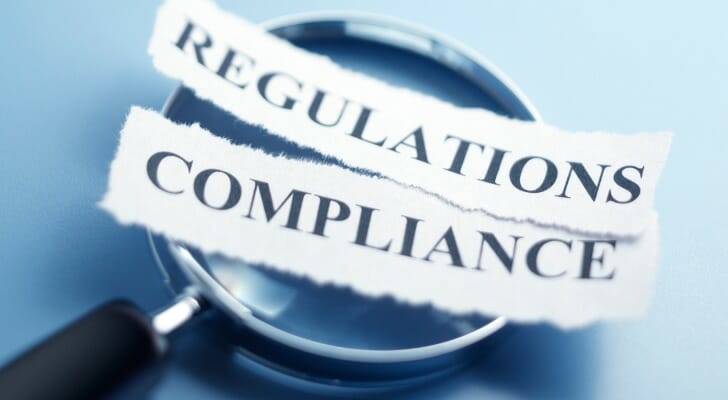
A Certified Regulatory and Compliance Professional (CRCP) is a credential offered by the FINRA Institute at Georgetown that focuses on U.S. securities regulation and compliance practices. The CRCP program is designed for compliance, legal and regulatory professionals working in financial services. It covers a mix of legal theory and practical application, including ethics, risk management, and enforcement trends.
If you need help selecting and managing your investments, match with a financial advisor who serves your area and see how they can help.
What Is a CRPC?
The CRCP designation is structured to provide a broad understanding of the financial regulatory landscape, with an emphasis on how rules are applied in real-world business settings. Rather than focusing solely on technical rules or procedures, the program explores how compliance intersects with business strategy, ethics, and decision-making.
The Financial Industry Regulatory Authority (FINRA) offers the CRCP in partnership with Georgetown University’s McDonough School of Business. FINRA previously administered the credential through a partnership with the Wharton School of the University of Pennsylvania.
The program introduces participants to case studies, regulatory frameworks and evolving industry practices, giving them context for how regulations are interpreted and enforced. The goal is to help professionals not only understand the rules but also anticipate how regulatory bodies might respond to specific conduct or systemic issues.
Graduates often use the credential to build credibility within compliance departments, legal teams and executive roles that require an in-depth grasp of regulatory risk. It is particularly relevant for those working in broker-dealers, investment firms, or any organization under FINRA’s jurisdiction.
With over 1,300 CRCP professionals, the CRCP designation has become a leading certification for compliance professionals.
CRCP Qualifications

To earn the CRCP designation, candidates must complete two weeks of coursework. They will work with world-renowned professors from the McDonough School of Business and Law and with experienced industry practitioners and regulators. In addition to the two weeks, professionals must complete pre-course reading and casework.
Week one covers supervisory practices, internal controls, ethics in the securities industry, sustainability and regulatory structures. Week two’s coursework builds on the concepts covered in week one by exploring a series of advanced regulatory and compliance topics.
Each week’s courses cost $7,500 for non-FINRA members and $6,500 for FINRA members and governments or regulators. After each week, candidates must pass a written assessment. Candidates who pass both assessments within two years receive the CRCP designation.
Once a candidate has earned the CRCP designation, they must complete 12 hours of continuing education credit. Every three years, candidates must complete these credits. Meanwhile, FINRA pre-approves and designs all qualifying continuing education credits.
CRCP Job Responsibilities
Regulatory and compliance professionals ensure that organizations stay up to date on all regulatory and licensing requirements in accordance with the company, state, and federal regulations. These professionals must apply policies and procedures that keep the company operating legally and ethically.
It’s the professional’s responsibility to conduct audits, and investigations, recommend areas of improvement and outline solutions. Sometimes, organizations work with third parties to conduct these audits and investigations. Compliance professionals act as liaisons between third-party auditors and their own organizations. Compliance and regulatory professionals must provide the appropriate documentation as well as evaluate the proposed audits.
From restructuring a compliance program to building one from the ground up, compliance and regulatory professionals are crucial to any effective business operation.
The Importance of Compliance
While you may not work directly with a compliance or regulatory professional, their role in their industries is extremely important to meet your needs. As a consumer, all compliance and regulatory officers are extremely important to ensuring your life and finances are properly protected and managed.
For example, compliance in the financial industry provides market stability and helps protect consumers’ interests. It also helps protect the taxpayer from potential ethical threats. Regulators and compliance officers reduce the possibility of a financial crisis.
Organizations like the Securities and Exchange Commission (SEC) are responsible for safeguarding investors. They also uphold the fair and orderly functioning of securities markets. The SEC may conduct audits alongside compliance officers to confirm firms are following federal law. Essentially, compliance functions as a checks and balances system to keep you and your interests safe.
Bottom Line

A Certified Regulatory and Compliance Professional demonstrates professional expertise in their field. They have gone through rigorous ongoing training to achieve their designation. As a result, they can uphold the laws and regulations of the industry they represent. Even if you don’t work with them directly, compliance professionals play a key role in protecting consumer interests.
Financial Planning Tips
- Are your finances in the hands of a reputable firm that’s playing by the rules? If you’re unsure, it may be time to look for a financial advisor. Finding a financial advisor that fits your needs doesn’t have to be hard. SmartAsset’s free tool matches you with up to three vetted financial advisors who serve your area, and you can interview your advisor matches at no cost to decide which one is right for you. If you’re ready to find an advisor who can help you achieve your financial goals, get started now.
- Regulations control how you can invest, what you can invest in, and even how financial firms handle your money. Even if you never meet a CRCP or other finance professional, it helps to have some working knowledge of what they’re enforcing and why.
Photo credit: ©iStock.com/DNY59, ©iStock.com/Nattakorn Maneerat, ©iStock.com/fizkes